So You Want to Talk About Race
So You Want to Talk About Race
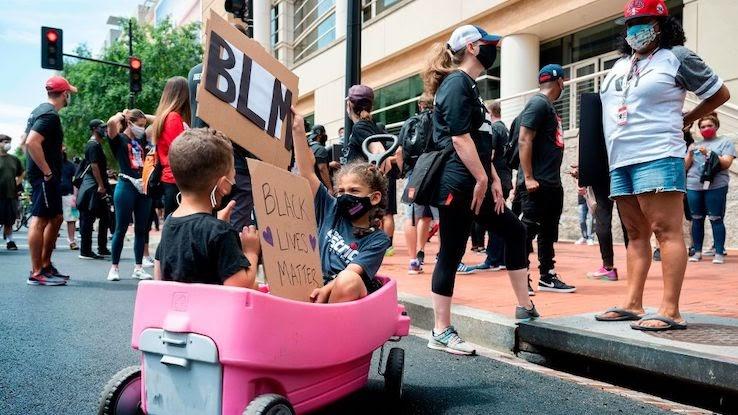
As many white people accept begun learning for the beginning time, systemic racism consistently and disproportionately affects people of color in the United states. In realizing the society-wide impacts of racism, nosotros're also realizing how complex information technology is — and that it'due south not enough to "not be racist" or to not acknowledge the part race plays in how people are treated on every level of society. Information technology's essential to work to become actively anti-racist, to "examine the ability imbalances betwixt racialized people and non-racialized/white people" and appoint in the procedure of "identifying, challenging and irresolute the values, structures and behaviors that perpetuate systemic racism." This must be done so we can create a guild that offers equal opportunities and treatment to everyone.
But adults aren't the just ones taking notice. Children beginning receiving messages almost race early on in their lives, and those questions can heighten lots of questions in kids' minds — questions that they may or may not vocalism. In working to be anti-racist, it'southward essential to initiate conversations about race with children and reply these questions. No matter how uncomfortable the topic may experience or what it forces us to confront, learning how to talk to kids virtually race, racism and inclusion is what needs to happen to shape young minds and ultimately steer kids towards anti-racist behavior — making the globe a better place in the process.
General Tips for Talking to Kids About Race
Talking about race tin be sensitive and overwhelming and confusing. And that's all the more reason why we demand to do it. Problems involving race are complex and tin can bring up new and uncomfortable questions and emotions, but it's our job to lean into that discomfort, to navigate those questions, not avoid them. Taking family and other dynamics into account, call back that there'south no cutting and dry way to navigate talking to kids nigh race — but some ways to go almost it are more effective than others. It's okay to acknowledge y'all don't take all the answers just will pursue them. Allow these tips to guide the procedure, keeping in mind that information technology'southward truly a learning experience for everyone.
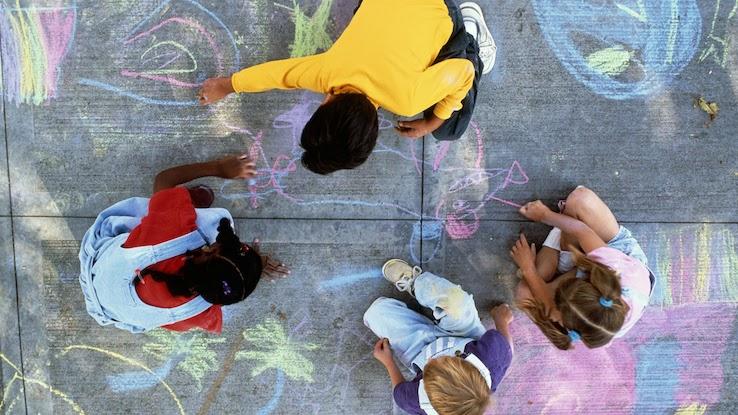
Make space for conversations. Children may be aware of what'due south going on in the globe, but they may not know how to address it — meaning adults should ready to initiate the conversation. Create and hold space for discussions to notice out how a child is feeling, and give them room to express their thoughts almost current events and race. Dr. Shardé Smith, Assistant Professor of Human Development and Family Studies at the University of Illinois, recommends opening the conversation but going at the child'south pace and "providing infinite for them to process…traumatic events, to inquire questions, [to] express their emotions and to have an open dialogue most the realities of race in our club." Think that these discussions can be overwhelming; let kids pace themselves, let them talk things out and be patient.
Start early on. Dr. Smith notes that "children every bit young as iii years former tin recognize and develop racial attitudes and biases," which means that it'southward most never likewise early on to start talking nigh race in an age-advisable way. For younger children, this might mean exposing them to "books with appropriate cultural representation…instilling these positive racial messages and engaging children in culturally diverse activities," according to Dr. Smith.
As they become older, it'southward appropriate to bring the element of order into discussion, start informing kids about how civilization shapes negative ideas of race and explicate why these stereotypes are wrong. Dr. Helen Neville, Professor of Educational Psychology and African-American Studies at the University of Illinois, notes that teens, developmentally, "are able to think most more than complex systems and…get the nuances of things like structural racism." Wait until children are a little older to introduce the level of intricacy that conversations almost systemic racism involve.
Don't forget how loudly actions speak. Talking with words isn't the only way to communicate ideas nearly race to children. Kids are perceptive, and the deportment that adults model for them can speak louder than words. It's important to call up earlier speaking when it comes to the ways we discuss race in front of children, of course. It's also essential to wait at what our other actions communicate. When a child looks up to a office model who doesn't have a various friend grouping, for example, that kid sees this every bit something normal and even something to strive for — and it goes without saying that the contrary is true. That'south our responsibility to change.
First using linguistic communication that's respectful and tolerant of people's differences while notwithstanding acknowledging those differences — and honoring them. Visit museums that host exhibits about a range of cultures. Brand sure kids have multicultural toys and markers and paints that stand for a variety of skin colors. Enroll kids in activities or team sports that accept more than diverse groups of children if their schoolhouse doesn't. Worship with people of different races, socioeconomic backgrounds and abilities. Broaden your own social group and invite friends of all races into your home.
We all "go raced" during our lives, pregnant we grade ideas about race that typically reflect the underlying ideas our order equally a whole holds about information technology — oft that white people are superior to people of color and thus more than deserving of opportunities and privileges. This is systemic racism at piece of work in the United States, but early on intervention via efforts to raise anti-racist kids is ane way to begin combatting these furnishings of racist biases we internalize.
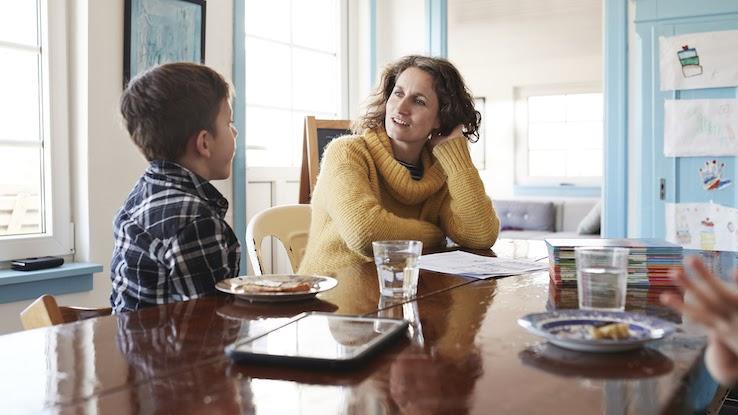
Unfortunately, it'southward become normalized that, as kids become raced, they may start placing value judgments on people of color. They might brand statements that frame something about a sure race as "less than" or "bad," with the implicit thought that that same characteristic in a white person "isn't as bad." It'due south important to listen for these kinds of statements and, when a kid makes them, to ask questions about why they feel that way. Not acknowledging these statements sends the message to kids that it'southward okay to hold sure biases or that what they're thinking is correct because they're allowed to keep doing then without questioning the thought processes behind it.
Get to the root of the thought by gently asking the child, "What makes y'all say that?" or "Why practise you feel that way?" Listen to their response without admonishing them. At that point, it's appropriate to explain stereotypes to them and work with them to think of examples that illustrate how those biases aren't true.
Showing the Harm of Racist Ideas
Education children about the reasons why stereotypes aren't true is one element of the equation, just it's also important to have this a step further and show kids how prejudice is harmful. Doing and so helps them develop a deeper understanding of the realities and impact of racism — that it causes intense and unnecessary suffering for people.
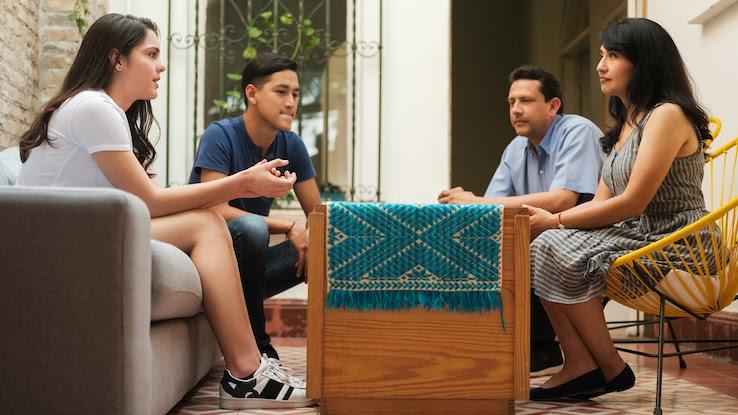
Even younger children oftentimes take a grasp on fairness and why it's important, and although it may feel simplistic to adults, positioning racism in this context can help kids begin to understand information technology using their own feelings every bit a frame of reference past inviting comparing to emotions they're already familiar with. Younger kids can cover the concept of words being hurtful and making someone feel bad, and they can besides understand how the intent of someone'southward words may have an unintentional impact.
If a child makes a statement involving a racist idea, have things a step further. Caryn Park, a researcher and professor at Antioch University's Schoolhouse of Education, recommends "ask[ing] the kid if something happened to make them experience that way and talk[ing] about what they were feeling" when they made the comment. With this information, Park continues, explicate "who benefits and who loses from such a comment…listen supportively for injure feelings of rejection or exclusion, and think virtually a plan to reconcile those feelings."
Again, when speaking with older children, it'south advisable to have a more nuanced chat. Discuss details of the historical basis of racism in the United States and bear witness how it has harmed various groups for centuries by providing examples from history to illustrate. This tin can atomic number 82 into a discussion about the ways racism persists today, how it's currently harming people, how current events are representative of the systemic racism present on all levels of social club and what the goals are of protestors and movements like Black Lives Matter.
Effective Resource for Pedagogy Kids About Race
Talking virtually race with a kid isn't a i-and-done proposition — it'due south a marathon, not a sprint. It'south important and necessary to be open for ongoing dialogue, to proceed request and answering questions to the all-time of your ability and to provide resources that brainwash kids long after an initial chat.
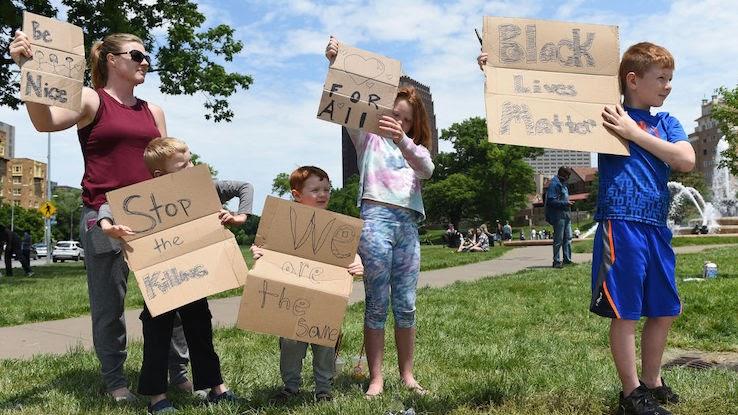
Ane constructive way to supplement your discussions is to provide children with a diverse range of books, movies and other media that highlight and applaud multifariousness and that address racial inequalities. Have inventory of the books and other media that are currently in your home and determine which groups of people they represent and how. Keeping a child's age in listen, begin introducing books and movies with stories that focus on people of color and ethnic groups in everyday situations, along with books that discuss the historical basis for racism, such as those nearly slavery. This listing volition assistance you infuse more than diversity into the media your child consumes past celebrating Black experiences, introducing Black characters and lifting up Blackness creators.
Start taking conversations a footstep further with some assistance and support from Talking Well-nigh Race, a resource from the National Museum of African American History & Culture. With different modules developed for parents, child educators and people who are committed to racial justice and equity, Talking About Race offers reading material, infographics and video content organized by specific themes and topics similar "Historical Foundations of Race," "Community Edifice," "Race and Racial Identity" and "Existence Anti-racist." As much about what to talk near with kids equally it is how to talk to them about it, this constructive tool provides guidance to empower adults to embark on the journey of pedagogy kids about race — and educating themselves in the process.
PBS has a like resource, Against Anti-Black Racism, that includes a media collection with videos for junior high and high school students "to aid them empathize the long history of anti-Black racism in the U.s., and think near means to address it in their own families and communities." These modules are geared more towards addressing current events and include news coverage of recent protests, videos near the Black Lives Matter movement and constabulary brutality, PBS documentaries about the history of racism in the United States and activities that can inspire kids to participate in civic engagement in their communities.
There'due south no more important time to start talking to kids of all ages nigh race. Early intervention is primal non only for helping children learn most racism and injustice in our guild but also for giving them the knowledge they need to recognize and, as they age, brainstorm disrupting the systems that let racism to persist. Every bit new generations of actively anti-racist kids emerge, it becomes easier for anybody to work to create a more but, equitable and flourishing society that affords anybody the same opportunity to thrive.
So You Want to Talk About Race
Posted by: brunolierected.blogspot.com
Comments
Post a Comment